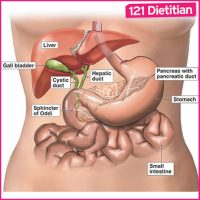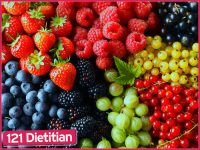How common are gallstones?
Gallstones are very common and there are many gallstones diets out there. It’s estimated more than 1 in every 10 adults in the UK has gallstones, although only a smaller number develop unpleasant symptoms.
Here at 121 Dietitian we see and assist patients each week with gallstones. This blog is to help you if you have symptoms and are needing trusted advice for a gallstones diet.

What are Gallstones?
There are two types of gallstones:
- The most common are cholesterol gallstones, made up of excess cholesterol in the bile.
- Less common pigment gallstones are made up of excess bilirubin.
The processing of these stones being made takes place in the gallbladder which is a small sac below the liver. The stones can be very small like gravel to single large stones.
- Interestingly gallstones can cause no symptoms in two out of three people who have them.
- If you do experience symptoms you may find problems such as upper right abdominal pain, yellowing of the skin or the whites of your eyes (jaundice), inflammation of the pancreas (pancreatitis), and gallbladder inflammation with paler stools and diarrhoea.
- Surgery is the treatment offered for people whose gallstones cause symptoms.
A combination of diet and lifestyle factors and genetics are likely the cause of gallstone formation.
Who is at risk of Gallstones?
- Women
- people over 40
- overweight people
Gallstones are also more likely if:
- Your bile contains too much cholesterol
- The outlet from your gallbladder is blocked or infected
- You have an underlying health condition – diabetes, liver disease, or sickle cell disease
- You have a family history of gallstones
What can flare up a gallbladder?
When we eat food, our digestion requires the gallbladder to actively squeeze bile salts, phospholipids, cholesterol, conjugated bilirubin, electrolytes, and water out of the gallbladder and down the bile duct to the small intestine.
If you have an inflamed gallbladder anything in the stomach can trigger this action and irritate it.
We know the gallbladder has to squeeze harder when there is fat in the stomach so anything fried, greasy, fatty, pizza, pastries, will upset the gallbladder.

Symptoms of a Gallbladder attack
Gallstones may lead to your gallbladder becoming inflamed (cholecystitis), which can cause:
- Pain below your ribs on the right-hand side
- Pain in your back and right shoulder
- Fever
- Nausea
- Biliary colic
If gallstones pass down your bile duct into your duodenum, you will experience a painful condition known as biliary colic.
The pain is usually felt in the upper part of your abdomen, in the centre, or a little to the right, and often occurs about an hour after a meal that has a particularly high-fat content.
The pain can be so severe that some people report they feel like they’re having a heart attack. Also, people can feel sick and may vomit.
Gallbladder and Obesity
If you are overweight or obese, losing weight will be really beneficial.
Avoiding highly restrictive plans when you have gallstones is essential, as rapid weight loss has been associated with developing more gallstones.
A safe weight loss of 1-2 lbs(0.5 to 1 kg) per week is what you want. 121 Dietitian’s specialist programmes provide you with a personal, safe and enjoyable lifelong plan.
What diet can I eat when I have gallstones?
- It is best to have smaller, more frequent meals and best not to fast for long periods.
- Choosing small amounts of fats like olive oil can assist the smooth regular contractions of the gallbladder.
- Eat more foods that are high in fibre these can be fruits and vegetables, lean meats and fish and wholegrain carbohydrates like Brown Rice and Quinoa, and lower-fat dairy products.
- Avoid refined carbohydrates and sugar.
What foods to avoid if you have gallstones?
Avoid eating too many foods with a high saturated fat content as cholesterol is involved in forming gallstones.
These include:
- meat pies.
- sausages and fatty cuts of meat.
- butter, ghee and lard.
- cream.
- hard cheeses.
- cakes and biscuits.
- food containing coconut or palm oil.
What is best to drink with gallstones?
Water is ideal for drinking as it dilutes and detoxifies impurities that impact your gallbladder. If you are experiencing an attack and you are not eating, drinking some protein water can assist with additional plant-based protein.
Alcohol is very interesting in regard to gallstones. Research has found that a moderate alcohol intake may help reduce the risk of gallstones, although researchers aren’t sure how this happens.
It is always necessary to note that even though it is thought drinking in moderation may lower the risk of gallstones, excess alcohol consumption can increase the risk of many health conditions.

What foods help heal gallstones?
Fresh fruits and vegetables. Whole grains (whole-wheat bread, brown rice, oats, buckwheat flakes) Lean meat, poultry, and fish. Low-fat dairy products.
Finally on the natural options
Getting active when you can is really important. Regular exercise is beneficial for your overall health. It can also help you maintain a moderate weight and prevent gallstones.
Ensuring you keep stress to a minimum and sufficient sleep are both important for assisting or reducing gallstone formation, attack, weight and health. Our 121 Wellness shop provides essentials to help you.
Medical treatments for gallstones
If natural recommendations do not treat gallstones effectively, then medications or surgery may be required.
Medication for gallstones
Ursodeoxycholic acid and chenodeoxycholic acid may be used to treat smaller gallstones.
These medications can take time to work (up to 2 years) and if stopped gallstones may return.
Surgery for gallstones
Cholecystectomy is the name for gallbladder removal surgery. Removing the gallbladder ensures that the gallstones cannot re-form.
If you are unsure of how to change your eating habits or need help optimising the foods you eat please do contact us. We would love to help you or your family and friends with any nutrition-related queries big or small.
In the meantime please check out our 121Dietitian Shop
If you have enjoyed this blog we would love you to share this with your family and friends on your social media channels.
Why not visit our YouTube Channel for more on keeping your health optimal.
How can a Dietitian help you with Gallstones
- Book a consultation via our Online Portal
- About Gillian Killiner
- Check out our tailored dietary programmes
Gillian x
Links included in this description might be Amazon affiliate links. If you purchase a product or service with the links that I provide I may receive a small commission.